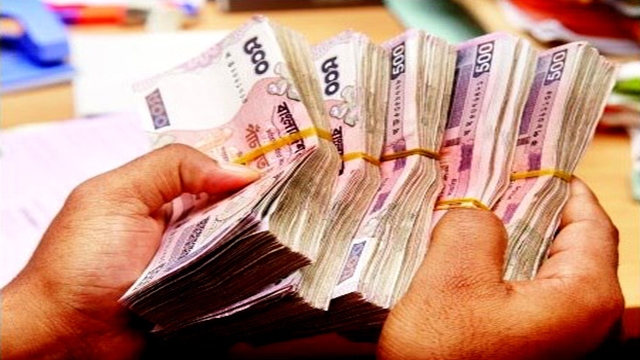Rubel Rana
Published:2018-08-13 16:58:27 BdST
BDT depreciation set to fuel external debt stocks
FT ONLINE
The local currency's depreciation against dollar is set to raise external debt stocks and interest payments largely, according to economists.
According to economics parlance, taka's depreciation against US dollar pushes up the country's external debt stocks.
Interest payments also grow large due to the depreciation.
Bangladesh Taka (BDT) depreciated 4.0 per cent in fiscal year (FY) 2017-18, according to the latest Monetary Policy Statement (MPS) of the Bangladesh Bank (BB).
The local currency further depreciated 1.8 per cent last July, the first month of the current fiscal year.
"Depreciation impacts adversely on the external stocks," said Dr Mustafa K Mujeri, executive director of the Institute for Inclusive Finance and Development.
He said taka depreciated largely for huge deficits of the current account of the balance of payments.
The current account deficit is estimated at $9.18 billion or 3.3 per cent of the gross domestic product (GDP) in the past fiscal year, according to the BB.
Dr Mujeri, however, said debt sustainability is now critically important as debt volume increases due to depreciation.
"If we abuse debts, it usually weakens repayment capacity," the former chief economist of the BB added.
The country's external debt volume stood at Tk 2.703 trillion in FY '18, according to the medium-term macroeconomic policy statement of finance ministry.
It is projected to go up by 12.7 per cent of the GDP to Tk 3.218 trillion in FY '19, it revealed.
On the other hand, interest payment liabilities were Tk 1.65 billion in the same period.
It is assumed that external debt interest payment was nearly $500 million in FY '18.
The actual debt interest in FY '18 was $477.6 million.
The calculation is based on the 4.0 per cent depreciation of taka in FY '18 from its previous fiscal's exchange rate (approximately Tk 79).
The average exchange rate was Tk 82.25 in FY '18.
Dr Ahsan H Mansur, executive director at the Policy Research Institute of Bangladesh, told the FE that depreciation is a risk as external debts are concerned.
The government needs to monitor movement of exchange rates and external debts on a regular basis to avoid risks, he noted.
Mr Mansur said, "This [depreciation] is important at a time when we're going for borrowing at higher interest rates as we're set to elevate into a developing country from the least developed country (LDC) status.
"From now on, we must be careful about our external debts," he mentioned.
In the meantime, the government projected that the cost of external borrowing will shoot up to Tk 29.4 billion this fiscal year, up by Tk 4.2 billion than the revised budget of FY '18, according to a government document.
Earlier, Bangladesh had reaped benefits of the stability in exchange rate regime.
However, depreciation bears multiple positives. It helps raise export receipts and remittance inflows.
It also makes imports costlier.
Unauthorized use or reproduction of The Finance Today content for commercial purposes is strictly prohibited.


